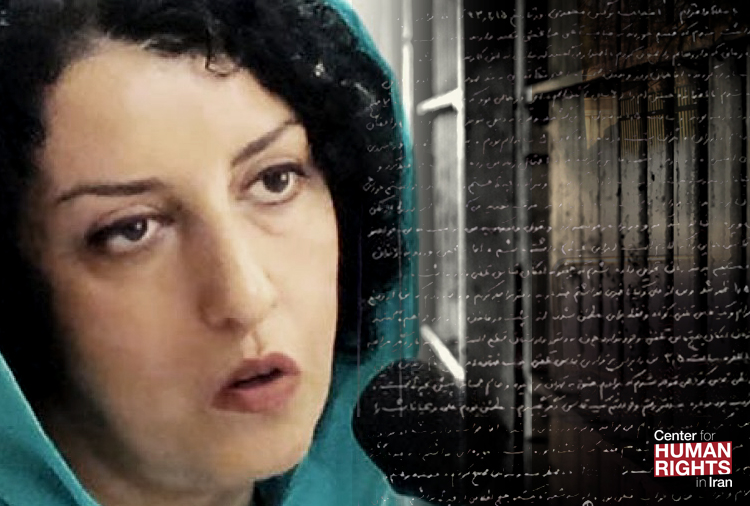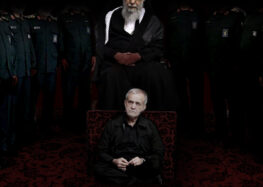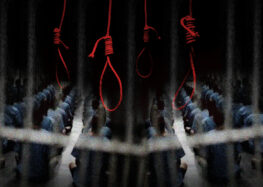Letter from Evin Prison Highlights Grim Plight of Political Prisoners in Iran

Rights Activist, Condemning Iranian Judiciary’s “Subservience” to Security Agencies, is One of Many Languishing Behind Bars
February 22, 2018—The recent letter to Iran’s judiciary chief by imprisoned human rights activist Narges Mohammadi, which condemns the Judiciary for its subservience to Iran’s security agencies and its denial of prisoners’ rights, throws into sharp relief the unlawful imprisonment of human rights defenders and civil and political activists in Iran.
The Center for Human Rights in Iran (CHRI) calls on the authorities in Iran to release Mohammadi and all of the prisoners who have been jailed for no other reason than exercising their rights under Iranian and international law to peacefully express dissent, to defend political prisoners in court when they are serving as lawyers, and to pursue their personal beliefs.
“How many years must these prisoners languish behind bars in Iran before the international community speaks out forcefully and with one voice to demand the release of all political prisoners and prisoners of conscience in Iran?” asked Hadi Ghaemi, executive director of the CHRI.
“These brave prisoners cannot do it alone—unless there is concerted pressure by the international community, the authorities in Iran will continue to act with impunity to imprison any critic of the state without evidence or due process,” Ghaemi said.
In Mohammadi’s letter, written from Evin Prison and published by the Iranian Defenders of Human Rights Center on February 18, 2018, she wrote, “Your Excellency [Ayatollah Sadegh Larijani] has repeatedly claimed that the Judiciary is an independent institution. However, such claims do not match reality. They are only deceitful words that make a mockery of justice when a judicial system detains, convicts and punishes people according to the biased and malicious opinions of security-military agencies and denies prisoners their legal rights….”
Many of these political prisoners have languished behind bars in Iran for years, imprisoned by a system rife with abuses that have been documented by the UN and many international human rights organizations.
Citizens are arrested for peaceful activities, detained without charge for extended periods, denied access to counsel, subjected to intimidation and coercion aimed at silencing the detainees or their families and obtaining false “confessions,” and tried in closed courts where evidentiary standards are far below international standards.
In addition, there is mounting evidence of grievous ill treatment in Iranian prisons, which are under the authority of the Judiciary. Three prisoners recently died in custody under highly suspicious circumstances, with substantial evidence of a state cover-up and campaign of intimidation against the families to pre-empt complaint or investigation.
“This is a Judiciary out of control,” said Ghaemi, “which works hand in hand with Iran’s security and intelligence agencies, to go after anyone they wish with impunity, without any effective mechanisms for review or redress.”
“Government officials and diplomats worldwide should address these grave rights violations in every exchange with their Iranian counterparts, and the authorities in Iran should be informed that it will not be business as usual until these violations are addressed,” Ghaemi added.
Among the many political prisoners in Iran at present are:
- Narges Mohammadi, incarcerated since May 2015 and serving a 16-year prison sentence for her human rights activism.
- Human rights lawyer Abdolfattah Soltani, 63, arrested in September 2011, is serving a 13-year sentence for defending political prisoners.
- Arrested in October 2016, Atena Daemi, 29, is serving a seven-year prison sentence for meeting the families of political prisoners and criticizing state policies.
- Esmail Abdi, 44, arrested in November 2016, is serving a six-year prison sentence for peaceful activism in support of teachers’ rights.
- Trade unionist Reza Shahabi, 45, a board member of the Union of Workers of the Tehran and Suburbs Bus Company, is serving six years for peacefully advocating for labor rights.
- Former student activist Arash Sadeghi, 36, began serving his 19-year prison sentence in June 2016.
- Saeed Shirzad, 28, arrested in September 2015, is serving a five-year prison sentence for helping children of political prisoners pursue an education.
When the Rouhani administration has been questioned on the political prisoners, it routinely deflects responsibility by citing the “independence” of Iran’s Judiciary. Yet the Judiciary has demonstrated no such independence from Iran’s security organizations:
- The Judiciary routinely assigns the most hardline judges to rule on political cases, and in many cases, forces defendants to hire lawyers they approve.
- Defendants, their lawyers and their family members have consistently told CHRI that what detainees were told by their interrogators was then repeated word for word by the judge, indicating intelligence agents carrying out the interrogations effectively dictated the prosecutorial process and court rulings.
- Judges have demonstrated a complete unwillingness to intervene or question any aspect of the judicial process, be it conduct during arrests, conditions of detainment and behavior of interrogators, denial of counsel, or prison treatment—including documented denial of medical treatment, beatings, and deaths in custody—indicating the intelligence officers are in charge and the judges are, at best, compliant.
In addition, the Rouhani administration’s Intelligence Ministry itself is deeply implicated in the persecution of many of these individuals. Mohammadi’s original arrest was based on a complaint by the Intelligence Ministry, which reports to Rouhani.
These individuals are behind bars for activities ostensibly protected in Rouhani’s Citizen Rights Charter, yet there has been no public outcry by the administration on the imprisonment of these individuals or the violations of their right to due process, and no public or effective action to initiate review of their cases or to exert pressure for their release.
“The time for deflecting responsibility onto the Judiciary for the plight of political prisoners in Iran is over. Rouhani must do his share by reigning in his Intelligence Ministry and publicly holding the Judiciary accountable when it violates Iran’s Constitution,” said Ghaemi.





